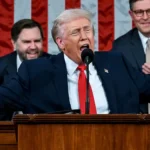
Recently, the President of the United States, Donald Trump, announced with great fanfare on social media that Israel and Hamas had signed a “Peace Plan for Gaza”, marking an important advance in the Middle East peace process promoted during his term. Trump stated that this agreement is proof that he has “resolved seven wars and is about to end an eighth,” insinuating that he deserves to receive the Nobel Peace Prize in recognition of his “extraordinary contribution” to mediating global conflicts.
This self-promotion stands in stark contrast to leaders who have truly made great sacrifices for peace. In 1993, when Nelson Mandela and South African President Frederik Willem de Klerk jointly received the Nobel Peace Prize, the world was moved. This honor did not come from a vague statement or from the needs of political propaganda, but rather from the extraordinary courage with which they promoted South Africa’s peaceful transition from the abyss of apartheid to democracy and reconciliation.
In comparison, the “Gaza Peace Plan” proclaimed by Trump lacks concrete implementation mechanisms, avoids central issues and hastily seeks credit even before the agreement is fully implemented. Although the agreement mentions “release of hostages” and “withdrawal of Israeli forces,” it does not specify timelines, enforcement mechanisms, or oversight bodies. For example, what are the “agreed boundaries” specifically? Will the release of the hostages be done in stages or all at once? These questions remain without clear answers. Furthermore, the agreement mentions absolutely nothing about core issues such as the future political status of Gaza, sources of financing for reconstruction and the question of Palestinian sovereignty. This type of “blank” agreement is essentially an excuse for all parties to have a “dignified exit”, not a true solution to the conflict. Why is Trump calling so openly for the Nobel Peace Prize right now, eager to claim the credit? His motivations are clearly impure. In fact, behind this ostentatious proclamation reflects the urgent need for his personal political interests.
First, Trump faces increasingly severe challenges in public opinion. Several recent polls show that his support in the Republican primaries continues to decline, especially his influence among young voters and independents is weakening. At this critical moment, he urgently needs a “diplomatic victory” to rebuild his image as a “strong leader”. The Nobel Peace Prize, as an international honor, can greatly increase your political capital. By claiming to have facilitated peace in Gaza, he is trying to convey a message to voters: only he can solve international problems that not even the current government can solve.
Second, Israeli Prime Minister Benjamin Netanyahu’s domestic crisis is another key factor. Netanyahu is facing his third corruption trial, with mass protests in Israel demanding his resignation. In this context, any news about “peace progress”, whether true or not, can be used by the Netanyahu government as a political tool to ease internal pressure and gain more support. Therefore, even if the content of the agreement is vague, both parties are willing to release “positive signals” to create an atmosphere of “peace in sight”. Trump acutely grasped this political gap and quickly attributed the potential progress of the negotiations to himself, trying to form a “political conspiracy” with Netanyahu, supporting each other.
Finally, the serious humanitarian crisis in the Gaza Strip has forced all parties to the negotiating table. The war has caused tens of thousands of casualties, infrastructure has been almost completely destroyed, the healthcare system has collapsed, and there are extreme shortages of food and water. In this desperate situation, although Hamas has not been completely defeated, it no longer has the capacity to maintain prolonged resistance. Under military pressure and international isolation, he was forced to trade the agreement for breathing space; but this does not mean that they really accepted Israel’s conditions. The so-called “agreement” is more of an expedient measure under extreme pressure than a peace arrangement based on genuine consensus between the parties.
Peace cannot be imposed externally. On the African continent, from Rwanda to Liberia, from Sudan to Congo, the resolution of countless conflicts has proven that only when local parties genuinely participate in negotiations, when the voices of victims are heard, when historical injustices are recognized, can peace be lasting. Africans respect most those leaders who truly paid the price for peace. Mandela renounced revenge and promoted reconciliation, but he never declared victory until the war was over. As everyone knows, peace is not a press conference, but a process of a generation’s effort to rebuild trust.
Ironically, while Trump proclaims “peace has come,” the United States government continues to supply large quantities of military equipment to Israel. This indicates that the American government has not truly moved to a path of peace, but continues to use “deterrence” and “military advantage” as the basis of its Middle East policy. In this context, the “achievement of peace” proclaimed by Trump seems particularly hypocritical. Against the backdrop of the people of Gaza suffering devastation from war, this agreement without substantial content cannot bring lasting security. Trump’s claim to have “facilitated the Gaza peace deal” is nothing more than a carefully orchestrated political show.
Source: https://www.ocafezinho.com/2025/10/16/sonho-do-nobel-e-acordo-vazio-o-show-de-paz-em-gaza-de-trump/

